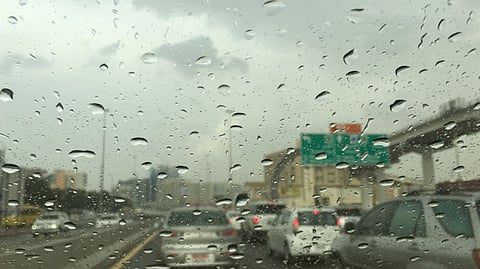Rain as an alternative source of water
The UAE Research Programme for Rain Enhancer Science is looking into how to stimulate rainfall in arid zones

The 2017 World Economic Forum Global Risks Report included a highlight from the 2016 survey of 750 experts who concurred that water scarcity poses the gravest threat to global society over the next decade. Some regions are obviously more arid than others. However, scarcity is not always about the lack of a natural resource, it can also, often, be about over-demand and mismanagement of an existing resource.
In the 1980s and 1990s, Denmark saw the economic and environmental waste of leakages and over-consumption. Policies were implemented to improve the delivery of water and to raise awareness about the value of water.
Denmark has been particularly successful in reducing water wastage in general and in particular has turned wastewater into “resource water” — investing in water is good for society, good for the environment and it’s good for business as it brings energy costs down too.
In a much more arid region where water is substantially scarcer and more expensive than oil, the Arabian Peninsula also sees the great value of investing in producing clean water for good reason: the oil will eventually run out and the peninsula would rely entirely on external sources of imported water. So far the most popular solution and rather expensive means of extracting large quantities of fresh water from the seas has been desalination.
Desalination is very energy intensive, costs a lot and produces brine — a salty sludge that no one really knows what to do with except throw back into the seas or dump into the desert. When the UAE announced a major solar-powered desalination plant a couple of years ago, Saudi Arabia responded by building a solar-powered desal plant that would be four times as big.
This kind of competition is good, it’s healthy for capitalism and it’s driving the transition to more sustainable modes of getting our energy and water.
Most countries cannot afford the high price tag of the solar-powered desal plants yet though, or if they do they prefer to invest in something else like wind energy or hydropower, when and where they have an abundance of water already.
Today, an estimated 60 per cent of global production of desalinated water is coming from the Gulf Cooperation Council (GCC) countries on the peninsula and globally desalination could grow by a third by 2020, according to Steve Griffiths, vice-president of Research at the Masdar Institute of Science and Technology, at the International Water Summit in Abu Dhabi.
How to make it rain
Between Abu Dhabi and Dubai there is a small strip of coastal land called Ghantoot that is where the Expo 2020 will host some activities. Right now, there is Racing & Polo Club and not much else, except for a testing station where Masdar, the clean energy company company owned by Mubadala, has created five joint ventures with European companies worth about $1-$2 million (Dh3.67- Dh7.34 million) each that are researching and exploring new technologies to scale-up and deploy desalination.
These are all relatively small plants compared to the offshore rigs drilling hundreds of holes deep into the sea bed in search for and in competition with their neighbours to tap quite literally into the remaining reserves of oil and gas. But these are important mini projects by Masdar/Mubadala standards as they have the potential of bringing more clean water in a more efficient way to more people.
Of the five plants, only one is exploring how to reuse part of the brine and to reduce the overall “outfall” (waste). There is no silver bullet for this one: the brine would have to be reprocessed in parallel treatment plants and reinserted into other industries that could use the minerals from the brine.
Costly process
This is an even more costly process: how to reuse brine is equivalent to how to store energy; they are the holy grails of the water and energy sectors. Back at the headquarters in Masdar City, researchers are happily exploring on ways to make it rain as means of coming up with an alternative source of water.
Apart from implementing forward osmosis, reverse osmosis, membrane distillation, brine treatment and integrating renewables at the desalination plants, the Masdar Institute and the UAE Research Programme for Rain Enhancer Science are looking into how to stimulate rainfall in such arid zones as the Arabian Peninsula.
These are exciting times to see such research and activity around addressing ‘public enemy’ number one — water scarcity.
The eastern part of the Arabian Pensinula is a veritable petri-dish of innovative projects to find sustainable solutions. In this case, it’s about using remote sensing to optimise cloud seeding in order to instigate more rainfall.
How that will affect the environment and the natural habitat is yet to be seen. And somehow it’s okay that there is vibrant almost emerald green Astro-turf ‘grass’ covering patches of sands by the highway: at least no water is being wasted.
Stuart Reigeluth is managing editor of Revolve Magazine and works at the Council for European Palestinian Relations in Brussels.


